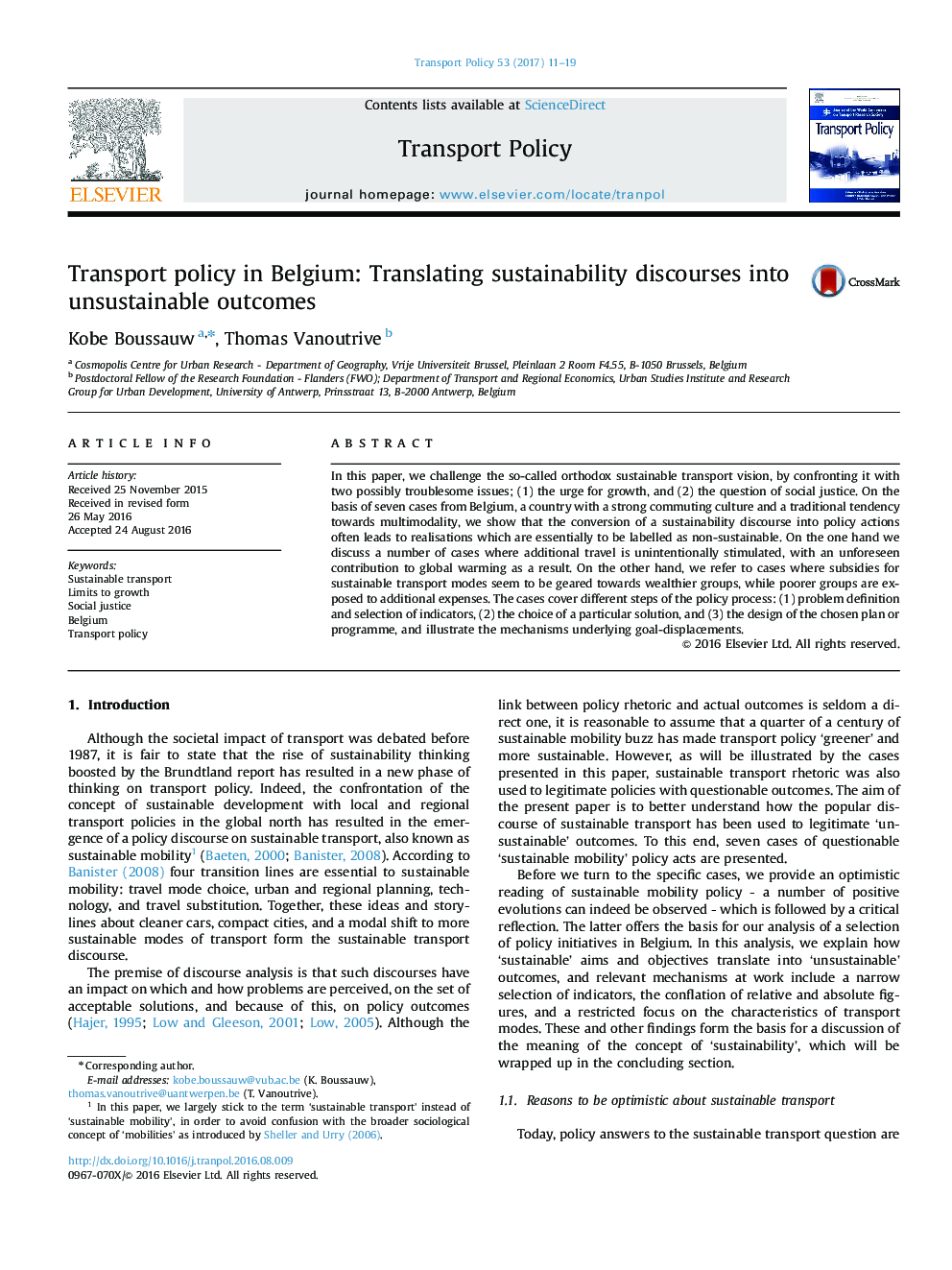| کد مقاله | کد نشریه | سال انتشار | مقاله انگلیسی | نسخه تمام متن |
|---|---|---|---|---|
| 7497290 | 1485824 | 2017 | 9 صفحه PDF | دانلود رایگان |
عنوان انگلیسی مقاله ISI
Transport policy in Belgium: Translating sustainability discourses into unsustainable outcomes
ترجمه فارسی عنوان
سیاست حمل و نقل در بلژیک: انتقال گفتمان پایداری به نتایج غیر قابل تحمل
دانلود مقاله + سفارش ترجمه
دانلود مقاله ISI انگلیسی
رایگان برای ایرانیان
کلمات کلیدی
حمل و نقل پایدار، محدودیت رشد، عدالت اجتماعی، بلژیک، سیاست حمل و نقل،
ترجمه چکیده
در این مقاله، چالش به اصطلاح به اصطلاح معتدل حمل و نقل پایدار، با مقابله با آن را با دو مسئله احتمالا مشکل است؛ (1) تمایل به رشد و (2) مسئله عدالت اجتماعی. بر اساس هفت مورد از بلژیک، کشوری با فرهنگ رفتاری قوی و تمایل سنتی به چندبعدی، نشان می دهد که تبدیل یک گفتمان پایداری به اقدامات سیاسی اغلب منجر به تحقق می شود که اساسا به عنوان غیر پایدار نامگذاری می شود. از یک طرف، ما در مورد تعدادی از موارد که در آن سفر اضافی ناخواسته تحریک، با یک کمک غیرمنتظره به گرم شدن کره زمین در نتیجه، بحث می کنیم. از طرف دیگر، ما به مواردی اشاره می کنیم که یارانه های مربوط به روش های حمل و نقل پایدار به گروه های ثروتمندتر تبدیل شده اند، در حالی که گروه های فقیر با هزینه های بیشتری مواجه هستند. موارد موارد مراحل مختلف فرآیند سیاست را پوشش می دهند: (1) تعریف مشکل و انتخاب شاخص ها؛ (2) انتخاب یک راه حل خاص؛ و (3) طراحی برنامه یا برنامه انتخاب شده؛ جابجایی
موضوعات مرتبط
علوم انسانی و اجتماعی
علوم اجتماعی
جغرافیا، برنامه ریزی و توسعه
چکیده انگلیسی
In this paper, we challenge the so-called orthodox sustainable transport vision, by confronting it with two possibly troublesome issues; (1) the urge for growth, and (2) the question of social justice. On the basis of seven cases from Belgium, a country with a strong commuting culture and a traditional tendency towards multimodality, we show that the conversion of a sustainability discourse into policy actions often leads to realisations which are essentially to be labelled as non-sustainable. On the one hand we discuss a number of cases where additional travel is unintentionally stimulated, with an unforeseen contribution to global warming as a result. On the other hand, we refer to cases where subsidies for sustainable transport modes seem to be geared towards wealthier groups, while poorer groups are exposed to additional expenses. The cases cover different steps of the policy process: (1) problem definition and selection of indicators, (2) the choice of a particular solution, and (3) the design of the chosen plan or programme, and illustrate the mechanisms underlying goal-displacements.
ناشر
Database: Elsevier - ScienceDirect (ساینس دایرکت)
Journal: Transport Policy - Volume 53, January 2017, Pages 11-19
Journal: Transport Policy - Volume 53, January 2017, Pages 11-19
نویسندگان
Kobe Boussauw, Thomas Vanoutrive,
